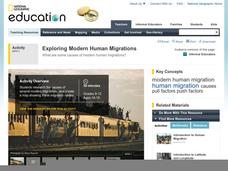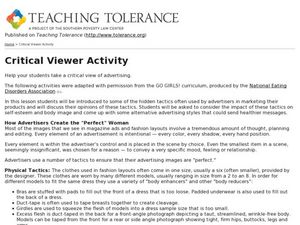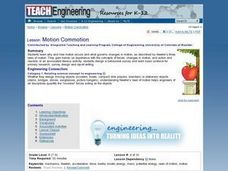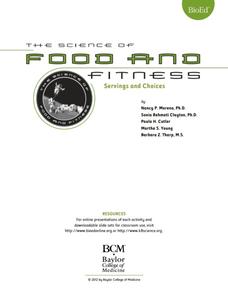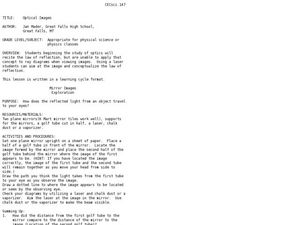Curated OER
Levers and Wedges in the Human Body
Young biologists identify parts of the body that serve as wedges (teeth and fingernails), and as levers (jaw, arms, and legs). The hands-on activities described here should be exciting for learners to perform, and should also lead to a...
National Geographic
Exploring Modern Human Migrations
Using maps, images, websites, and handouts, learners work to understand the nature of human migrations. They compare and contrast human migration from the past to the present, identify causes for migration, and trace migration routes on...
Curated OER
Sports
Pupils understand that elements of sport and/or physical exercise are important aspects of certain jobs. In this sports lesson plan, students discuss sport related careers, listen to speakers who have sport related careers, and research...
Curated OER
Seeing the Seafloor Using Sound - Multibeam Sidescan Sonar
Students are told that sound is not just stuff that our ears hear. They are explained that it is a tool for measuring and looking at objects in a new way. Students are introduced to sound waves and sonar imaging. They are explained...
Curated OER
Make a Pinhole Viewer
In this light worksheet, students construct a pinhole viewer using a paper box, wax paper, tape and a pushpin. They answer six questions about their observations, the orientation of the images they saw, and the results of their experiment.
Curated OER
Ancient Rome
Students complete pre reading, writing, during reading, and interdisciplinary activities for the book Ancient Rome. In this reading lesson plan, students complete journal entries, go over vocabulary, answer short answer questions, have...
Curated OER
Critical Viewer Activity
Students practice media awareness. In this media awareness instructional activity, students analyze print and electronic media messages. Students discover how advertisers use re-imaging to manipulate photographs and discuss how they can...
Teach Engineering
Changing Fields
Eddy currents, Faraday's Law and Lenz's Law provide the connection between train brakes and and MRI machines in a lesson that asks teachers to provided the material needed so the pupils can understand the properties of changing magnetic...
American Museum of Natural History
See the Light
It's time to see the light! Scholars perform three different experiments with light to reveal properties using a great remote learning resource. The pupils see how light reflects from a surface and refracts through different materials....
DocsTeach
Lewis and Clark's Expedition to the Complex West
Lewis and Clark's famous expedition is a prime example of the United States' westward expansion. Aspiring historians examine maps from Lewis and Clark's journey, as well as discuss their interactions with Native American tribes. The...
Calculated Industries
Army Survival
Intended as a reference tool for US Army personnel, this application can be used in a classroom that is studying historic and current wars or as part of an outdoor education or wilderness survival course. Some of the subjects addressed...
Curated OER
Marshland Ecosystem
Students classify animals based on their physical characteristics and eating habits. In this animal identification lesson plan, students investigate the life forms shown on a Parisian ceramic basin, and discover ecosystem the...
Curated OER
Science: Motion Commotion
Students examine Newton's three laws of motion to discover what causes it and how it changes. They conduct motion experiments by building catapults and constructing balloon rockets. Finally, they conduct peer studies correlating...
New York City Department of Education
Egypt
This six-week unit encompasses all subjects with a focus study on world history and the development of ancient civilizations. As gifted and talented students dive into the interesting yet challenging topic of Egypt, they...
Teach Engineering
Thrown for a Loop
Round and round it goes. Class members observe a current carrying loop in a magnetic field and calculate its associated torque. They then apply what they have learned to example problems to solve for the torque and to calculate the...
Curated OER
Text as Object and Art: Aesthetic Impact on Audience Reception of Books in the Early Renaissance and Today
Tenth graders examine the role that aesthetics play in the publication of books. In groups, they apply the concept of physical affectation on each reader's experience to literature. They also compare and contrast the varied types of...
Baylor College
Servings and Choices
An important part of balancing caloric intake to energy expenditure is knowing how many Calories you are consuming. In the fifth of a seven-lesson series on food and energy, learners estimate their daily caloric intake, then use a...
Curated OER
Let's get physical!
Students create gestures based on words they circle from reading Richard III. In this gestures lesson plan, students create images for the words they are supposed to underline and recite parts of the passage together.
Curated OER
Exploring Infrared Image Technology
Learners investigate the formation of infrared images. In this physics lesson, students discuss the different application of infrared imaging technology. They compare this to images formed by visible light.
Curated OER
Physical Difference and Classification
Students use a microscope and observation skills to compare and contrast several physical properties and develop a classification system.
Curated OER
Optical Images
Ninth graders study optics and the law of reflection. In this optical images lesson students use a laser and conceptualize the law of reflection.
Curated OER
Mussel Identification Activity
Students identify given species of animals, such as various
mussels, by sets of physical characteristics as they use a key. They also read about mussels on the Illinois River and look at mussel species in the online database. Finally,...
Monterey Bay Aquarium
What's in a Name?
Combine art and word analysis in a lesson about genus and species. Elementary children sleuth out the meaning of scientific names for a number of shark species using a prefix and suffix definition chart. They then draw an image of the...
National Museum of Nuclear Science & History
Alphas, Betas and Gammas Oh, My!
Referring to the periodic table of elements, nuclear physics learners determine the resulting elements of alpha and beta decay. Answers are given in atomic notation, showing the atomic symbol, mass, atomic number, and emission particles....



